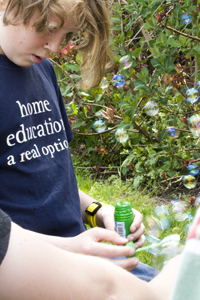Part of problem here is a wide cultural gap between the school culture and informal learning culture common in home educating families and communities.
Whilst LA officers went to school, taught in schools and predominantly have experience of group based state education – SATs, National Curriculum etc home eduction is NOT school.
It uses very different methods because it is one to one, highly personalised. It is conversation based and independent learning is the norm. Many (maybe most) people without experience of alternative education are unable to assess it, and often are unable to recognise it in progress.
Not only that but sometimes LA officers deem education unsatisfactory because they have an artificial set time for education in mind – and home ed happens every moment of a child’s day – as they play, talk and explore their world. Other times it is deemed unsatisfactory because a family chooses to submit a written report rather than accept visits which can be highly stressful and particularly damaging for children with special needs or who have had bad experiences in school.
Sending teachers and school inspectors to assess home education is like getting the Pope to assess a Muslim, Jewish or CofE’s families religious views and practices.
There are many different approaches to education – many of which are not used in state schools so experience of school based education is hardly a qualification to assess home education.

